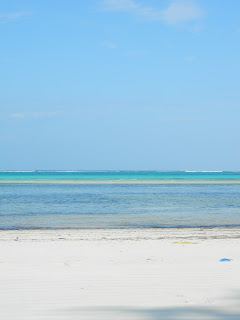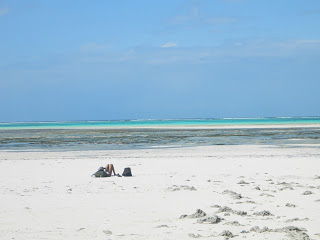Walk along Miami Beach in a string bikini, and you’ll fit right in. Opt for boy shorts, and you’ll probably feel overdressed.
Now, do the same thing in Zanzibar, and unless you are on a truly private beach, chances are you’ll feel very uncomfortably exposed.
That’s why many large resorts have private beaches. That, and the fact that nothing says luxury like owning your own piece of the ocean.
Zanzibar is between 95% and 99% Muslim, depending on who you ask, and though local women express their faith in various fashions—some wearing full sleeved dresses and somber-hued veils, others donning brightly colored and fashionably tailored items, and still others wrapping vast kangas (traditional patterned fabric) around their bodies and heads—all of them do so modestly.
Women don’t show their bodies in public, so men don’t see many bodies. Thus, as my partner once—rather rudely—pointed out, for local men, “seeing exposed skin is like porn.” Harsh, but not inaccurate.
There’s a paradox here, because Zanzibar’s major industry is tourism.
This industry packages Zanzibar as a remote, tropical island paradise escape and sells this vision to tourists looking for beach holidays, water sports and romantic adventures—for the most part. The people who populate the island, however, are Muslims, the female half of whom does not swim, does not frolic, lightly clad, in the surf (like the beautiful images on brochures) and seemingly finds it quite entertaining to observe the foreign antics of ever-growing hordes of visitors. (How they really feel about these foreigners, I will not presume to guess.)
It’s a paradox because we are looking at a massive (and growing) industry built on a beach culture that never before existed and, in context, appears shocking and clumsily out-of-place.
(A foreign woman visiting Zanzibar is left with three options. She can:
A. Wear the swimsuits which would feel appropriate or even modest at any American or European beach and feel very uncomfortably exposed.
B. Not swim. (Not a real option.)
C. Find a truly deserted beach—as most of the coast is populated by fishing villages or mangrove forests, this last option is unlikely, unless she books her stay at an exclusive, gated resort.
D. Why is there no D?)
 |
| (It’s not as deserted as it looks.) |
This paradox is hardly unique to Zanzibar. If you follow the equatorial belt around the world, you won’t find many places where short shorts and bikinis seem appropriate. And still, as travelers seek more exotic, more remote, more different destinations, anywhere with a nice beach is liable to become “the next Thailand,” or the next “place you need to visit in the next decade.”
Why the hurry? I think that’s a story for another day.
Meanwhile, many of these tropical paradise escapes are rather unlikely and incongruous candidates when you really think about it. I mean, I want to comfortably lie on a beach without offending anyone’s religion, attracting large amounts of attention, arousing anyone’s fantasies of “Western Women,” or shocking anyone with different expectations of modesty… I can’t be the only one!
Where’s the solution?
I don’t think there is one… anyone have any better ideas?
***

Totally relate! I studied abroad in Barcelona and had somewhat of an opposite experience. Many women there swam topless and/or in small bikini bottoms or thongs. There I was in my one piece bathing suit completely out of place. I think the key is to find a balance between what you feel comfortable with and what is respectful for the culture
Thanks for your comment, Alexandra! I agree–it absolutely goes both ways.
Happy swimming! 🙂
I think we must find the right place when bikinis or short are acceptable with local people. I was in Bali long time ago, when the tourists or visitor swimming topless or wearing bikini string were common, because the native Balinese also live topless in the village. So, they don't feel offended with topless or short.